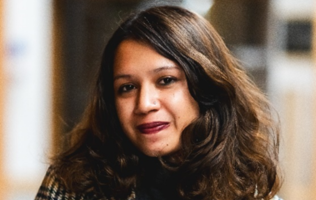
We spoke with Gayathri Sankar, a talented recipient of The Sonny and Gita Mehta India Scholarship, which supports aspiring writers from India, pursuing their Creative Writing studies at UEA. Gayathri's journey vividly illustrates the meaningful impact of scholarships, showing how they change lives by opening doors for young individuals to chase their academic dreams.
UEA is the place where literature thrives, offering scholars an opportunity to study at the UK's most prestigious Creative Writing programme. Established in 2021, The Sonny and Gita Mehta India Scholarship aims to assist writers from India. It has been instrumental in fostering emerging talents, and to date it has supported three scholars successfully complete their Creative Writing courses at UEA.
The Sonny and Gita Mehta Scholarship Programme comprises of three distinct scholarships: The Sonny and Gita Mehta India Scholarship, designed for individuals from India; The Sonny and Gita Mehta Scholarship for Writers, aimed at supporting writers hailing from the Indian Subcontinent, South East Asia, the Middle East, or those identifying as Roma; and The Sonny and Gita Mehta Scholarship for UK writers with outstanding creative writing potential.
Can you tell us a bit about yourself and what led you to choose UEA’s creative writing course?
When I look back, many paths seem to have led me to UEA, even before I began to consider a master’s degree. Sir Kazuo Ishiguro OBE FRSA FRSL was one of my favourite authors growing up, as well as Ian McEwan CH CBE FRSA FRSL – both prolific writers who attended the course. While researching time and temporality in fiction for my undergraduate thesis I came across About Time, a fascinating book by Mark Currie, who was a Professor at the university.
When I began to speak to people who had attended UEA, I fell in love with the idea of Norwich. In my life so far, I’ve either lived in busy metropolitans or secluded rural areas – Norwich seemed like an enchanting in-between. My novel is also set in a sort of university town, so this setting was perfect. It has the warmth and intimacy of smaller towns, with the life and energy of a bigger city.
How has receiving The Sonny and Gita Mehta Scholarship for Writers Scholarship supported you and your studies at UEA?
To be a good writer I find it important to nourish my mind and keep it engaged, even outside the classroom. My scholarship has allowed me to peruse bookstores endlessly, and build a library away from home. It’s allowed me to catch numerous films at the Picturehouse, to attend concerts and explore the city. I’m able to spend my free time at the lakes or cathedrals or library. Although we all want to immerse ourselves completely in our writing, time and energy is a limited resource, especially for students juggling jobs to support themselves. I’m grateful every day for being given that time to spend productively.
How has your experience studying at UEA been so far? Can you describe a specific moment that has been particularly enjoyable or memorable?
Before UEA, I considered writing to be a largely solitary experience. Shortly after the course began, a couple of students across cohorts decided to book a study room in the library to work together. The atmosphere was so reassuring: sitting side-by-side while occupying our own worlds, pushing towards the same goal. After a few hours we went for a walk around the lake, swapping stories and ideas. Everyone was so warm and enthusiastic about each other’s work. I remember how energizing it felt to step out into nature – to reconnect with the outside world before stepping back into our own. It’s a simple memory, but one I’ll cherish.
Are you involved in any extracurricular activities at UEA? How have these experiences complemented your studies?
Since writing is such a mental activity, it’s almost imperative for me to take some time off and occupy my body. I’ve loved attending dance workshops, and even attended my first archery class. That aside, the university is constantly brimming with activity. I can always count on a book-reading or literary event to invigorate me when I feel like I’m in a slump.
How do you balance the academic side of creative writing with your personal, creative expression?
I’ve always been inclined to add my own creative spin to academic work – playing with the form or structure, adding a personal element. This course has allowed me to embrace that side of myself more completely, but I’ve also come to learn that it’s important to master convention and genre in order to break it. I feel like I can count on my peers and tutors to make the small fixes, like punctuation and grammar, but also trust them with my more personal expressions.
Looking to the future, what are your career aspirations beyond your studies at UEA?
My course has helped me realize how much I enjoy reading and editing other people’s work, as well as being in a classroom setting. I’ve always been interested in teaching, and am considering pursuing a creative and critical PhD as a step towards that goal.
Alongside that, I feel closer to my goal of becoming a novelist – my book comes more alive every day.
To learn more about supporting students through scholarships, contact the Development Office at giving@uea.ac.uk.

)